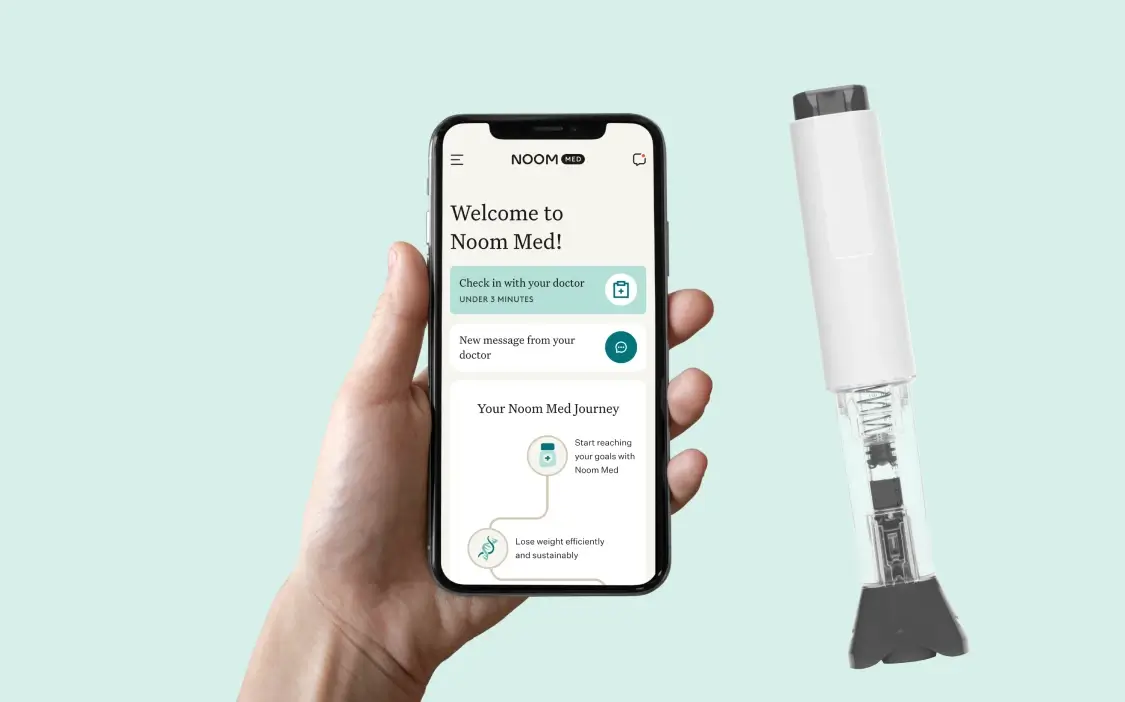Introduction to Noom Semaglutide
Noom Semaglutide represents a promising paradigm in the realm of weight loss solutions, intertwining the pharmacological benefits of semaglutide with Noom’s scientifically backed psychology-based approach. Semaglutide is a medication originally developed for managing type 2 diabetes; however, its application has extended into obesity treatment, demonstrating substantial efficacy in promoting weight loss. In conjunction with this pharmacotherapy, Noom provides a platform emphasizing behavioral change, which is essential for sustainable weight management.
The Noom weight loss program harnesses the power of semaglutide by helping individuals manage their appetite and food intake while simultaneously addressing the psychological triggers that contribute to overeating. The synergy between medication and psychological strategies forms a comprehensive approach aimed at achieving long-term weight loss success. This dual focus is critical as many individuals lose weight only to regain it shortly after. By integrating Noom’s behavioral change techniques, users are equipped with the tools needed to develop healthier habits that persist beyond the duration of the program.
Noom reviews indicate that participants appreciate this unique combination of medication and education, considering it a game-changer in their weight loss journey. Additionally, the Noom GLP-1 receptor agonist function of semaglutide aids in appetite regulation, motivating users to make healthier food choices that align with their weight loss goals. With an emphasis on personalized strategies enriched by data-driven insights, the Noom Semaglutide program promotes accountability and self-discipline.
Overall, Noom Semaglutide offers a groundbreaking solution for those seeking to overcome weight-related challenges. By merging the clinical effectiveness of weight loss drugs, like semaglutide, with behavior modification dynamics, participants can achieve not only weight loss but also improve their relationship with food, leading to lasting health benefits.
Understanding Semaglutide: The Science Behind Weight Loss
Semaglutide is a glucagon-like peptide-1 (GLP-1) receptor agonist that has garnered attention for its efficacy in aiding weight loss. Originally developed as a treatment for type 2 diabetes, recent studies have revealed its significant potential in weight management, making it an integral component of the Noom weight loss program. Semaglutide functions by mimicking the effects of the GLP-1 hormone, which is released in the gut after eating. This hormone plays a crucial role in appetite regulation and glycemic control, thereby promoting satiety and reducing hunger.
The mechanism by which semaglutide aids in weight loss involves several metabolic processes. It helps slow gastric emptying, leading to a prolonged feeling of fullness after meals. Additionally, semaglutide influences brain signaling pathways related to appetite, effectively reducing dietary intake. Clinical trials have demonstrated promising results, with participants achieving significant weight loss when using semaglutide in conjunction with lifestyle interventions such as those promoted by Noom. For instance, a pivotal study published in the New England Journal of Medicine indicated that participants who received semaglutide experienced an average weight loss of 15% over 68 weeks, validating its effectiveness as a weight loss drug.
The impact of semaglutide on weight management is further supported by numerous Noom reviews, which highlight the positive experiences of users who incorporated the medication into their lifestyle adjustments. With its endorsement by clinical research and user testimonials, semaglutide stands out as a potentially game-changing option in the Noom weight loss arsenal. It is important to note, however, that combining semaglutide with a structured program like Noom maximizes its potential benefits, as personalization and psychological strategies are crucial components of sustainable weight loss efforts.
The Psychological Foundations of Noom
The Noom weight loss program integrates several psychological principles aimed at facilitating lasting change in behaviors related to food, exercise, and overall health. Central to this approach is Cognitive Behavioral Therapy (CBT), a technique that emphasizes the relationship between thoughts, feelings, and behaviors. By assisting users in recognizing and altering negative thought patterns, Noom fosters a mindset conducive to healthy eating and lifestyle choices. This process facilitates an understanding of triggers, enabling individuals to make deliberate and healthier choices that align with their weight loss goals.
Another essential component of Noom’s psychological framework is habit formation. Noom encourages users to establish sustainable eating habits and regular physical activity, critical for achieving long-term success in weight loss. The program teaches participants to set realistic, achievable goals, employing a gradual method for habit integration. This approach reduces overwhelming feelings, making the journey towards healthier living more manageable and encouraging persistence even in the face of obstacles.
Furthermore, motivation plays a pivotal role in Noom’s strategy. The platform employs tailored feedback and engaging content to sustain users’ interest and commitment. By utilizing techniques like gamification, Noom leverages intrinsic motivation, promoting a sense of accomplishment as users track their progress. Moreover, the social aspect of the community feature enables participants to share their experiences, further motivating individuals through mutual support and encouragement. This collective engagement reinforces the importance of accountability and connection to foster a healthier lifestyle.
In conclusion, Noom’s innovative approach intertwines psychological principles that empower users to transform their behaviors regarding diet and exercise. Through strategies rooted in CBT, habit formation techniques, and a focus on motivation, Noom promotes a sustainable and supportive environment for individuals embarking on their weight loss journeys.
How Noom Works: The User Experience
The Noom weight loss program is designed to provide a comprehensive and interactive experience for its users. Upon signing up, individuals are greeted with a straightforward interface that facilitates navigation and enhances user engagement. The first step in the process involves completing an initial questionnaire, which assesses personal health metrics, behavioral patterns, and individual weight loss goals. This allows the platform to tailor its approach to each user’s unique circumstances.
One of the standout features of Noom is its effective goal-setting mechanism. The app encourages users to set realistic, achievable milestones that align with their weight loss aspirations. By breaking down larger goals into smaller, manageable tasks, users are less likely to feel overwhelmed, promoting consistent progress. Each user is guided to track their daily food intake, utilizing an extensive food database that simplifies logging meals. This feature not only aids accountability but also helps individuals understand their eating habits and make informed dietary choices.
Furthermore, Noom’s approach incorporates personalized coaching, where users are paired with dedicated coaches who provide ongoing support and motivation. Through regular check-ins and encouragement, users can develop healthier habits, focusing not only on weight loss but also on cultivating positive psychological changes. The app promotes the notion of mindful eating, urging users to recognize emotional triggers and behavioral patterns that influence their relationship with food.
Additionally, Noom’s platform frequently incorporates educational content, including articles and tips about nutrition, exercise, and mental wellness. This integration of educational resources allows users to make informed decisions and fosters a sense of community through shared experiences. Overall, the user experience on Noom is structured to motivate and guide users in implementing behavioral changes, ultimately leading them toward their weight loss goals with the support of Noom semaglutide and associated resources.
Key Features of Noom Semaglutide Program
The Noom Semaglutide program offers several key features designed to enhance weight loss and promote lasting habit change. A foundational component of the program is its daily educational articles, which serve to inform users about the psychological and physiological aspects of weight management. These articles provide valuable insights into healthy eating practices, emotional eating triggers, and the science behind weight loss, all grounded in psychological principles. By fostering knowledge, Noom empowers individuals to make informed choices and supports the development of healthier behaviors over time.
Community support is another integral aspect of the Noom Semaglutide program. Participants gain access to a diverse network of fellow users, creating an environment that encourages sharing experiences, challenges, and successes in their weight loss journeys. This sense of community not only provides motivation but also enhances accountability, making it more likely for individuals to adhere to their weight loss plans. Within this supportive network, users can exchange Noom reviews, tips, and encouragement, helping to reinforce positive habits.
The program also features advanced tracking systems, allowing users to monitor their food intake, physical activity, and emotional states. This data-driven approach enables individuals to identify patterns and triggers that may affect their weight loss efforts. By understanding these patterns, users can make necessary adjustments to their behaviors. Furthermore, Noom incorporates health coaches who provide personalized guidance and feedback throughout the journey. These coaches play a pivotal role in helping users set realistic goals and stay motivated, ensuring that they remain focused on their weight loss objectives.
Incorporating these features, the Noom Semaglutide program stands as a comprehensive tool for individuals aiming for effective weight loss. By blending education, community engagement, tracking mechanisms, and professional support, Noom facilitates not just the achievement of weight loss goals, but also the establishment of healthier lifestyle habits, embracing both the mental and physical dimensions of health management.
Success Stories: Real Users, Real Results
The Noom Semaglutide program has transformed the lives of many individuals struggling with weight management. Participants have reported remarkable success, not just in terms of weight loss, but also in their overall well-being. One user, Sarah, shared her journey of losing over 30 pounds within six months. Initially skeptical about the program, she found motivation and support through the interactive, psychology-based approach Noom is known for. Sarah credits the program’s emphasis on behavioral change and goal setting as the key factors that led to her success.
Another participant, James, struggled with obesity for over a decade. He began using Noom Semaglutide and became an advocate of the Noom weight loss method. James faced challenges such as emotional eating and cravings, but the comprehensive resources provided by Noom helped him develop healthier coping mechanisms. With a combination of weekly check-ins and a community of support, he managed to shed 45 pounds. His story illustrates that, although challenging, weight loss can be achieved through consistent effort and the right tools.
Diana, a working mother, opted for Noom Semaglutide to balance her busy lifestyle with her health goals. She reported using the Noom app daily to track her meals and activities, allowing her to see patterns in her habits. This awareness played a significant role in her weight loss journey, helping her to lose 20 pounds in three months. Diana emphasizes the importance of community feedback included in Noom reviews, stating that hearing others’ stories helped keep her motivated.
These testimonials not only provide insights into the journey of losing weight with the Noom GLP-1 program, but they also showcase diverse experiences and strategies that have led to tangible results. Each user’s success story serves as a testament to the effectiveness of integrating psychological strategies into a weight loss regimen. Such stories not only inspire others but also highlight the differences Noom can make in the quest for effective weight management.
Addressing Potential Challenges and Limitations
While the Noom Semaglutide program offers an innovative approach to weight loss, users may encounter various challenges and limitations during their journey. Firstly, adherence to the program can be a significant hurdle. Many individuals struggle to maintain consistency, particularly when faced with life’s demands and inevitable setbacks. It is essential to acknowledge that behavior change requires time and commitment. Implementing small, manageable goals can enhance engagement and help users build a routine that contributes to long-term success.
Another common difficulty is managing emotional eating triggers. Emotional eating can be detrimental to any weight loss strategy, including the Noom weight loss program. Users often turn to food as a coping mechanism during times of stress, sadness, or anxiety. Recognizing these triggers and developing strategies to cope with emotions in healthier ways is pivotal. Utilizing tools such as mindfulness and journaling can assist users in identifying patterns and finding alternative outlets for emotional expression, ultimately fostering a more positive relationship with food.
Moreover, the complexities of managing medications, particularly when utilizing Noom GLP-1 drugs, can pose a challenge for some individuals. Users must collaborate closely with healthcare providers to ensure that dosages are appropriate and that any potential side effects are monitored. Understanding the role of Noom Semaglutide in conjunction with lifestyle changes can be critical for achieving the desired outcomes. Users should not hesitate to seek support from healthcare professionals to navigate these complexities effectively.
To mitigate these challenges and promote resilience, individuals embarking on the Noom Semaglutide journey should establish a supportive community, whether through online forums or in-person groups. Sharing experiences and coping strategies can encourage and help maintain motivation. By collectively addressing these potential barriers, users can maximize their chances of success with Noom and embark on a sustainable path to weight loss.
Comparative Analysis: Noom vs. Traditional Weight Loss Programs
The landscape of weight loss programs is diverse, with traditional methods often emphasizing caloric restriction and exercise as the primary strategies. These programs can be effective in the short term; however, many individuals find them challenging to adhere to over extended periods. Enter Noom Semaglutide, which takes a different approach by integrating psychological principles into its weight loss methodology. This psychological focus encourages users to develop healthier habits and thought patterns regarding food and exercise, ultimately fostering long-term sustainability compared to conventional diets.
One of the striking differences between Noom and traditional weight loss programs lies in their effectiveness. While many conventional diets can yield rapid results, they often fail to promote lasting change, leading to the notorious cycle of weight regain. In contrast, the Noom weight loss approach, fortified by semaglutide, emphasizes behavioral changes and education, which can lead to more sustainable results. Noom’s methodology is grounded in the principles of Cognitive Behavioral Therapy, which helps users identify and overcome mental barriers associated with food, thus allowing for more robust weight management in the long run.
Sustainability is another vital factor where Noom excels. Traditional weight loss programs often impose strict rules that can lead to feelings of deprivation. Noom promotes a more flexible and individualized approach, enabling users to enjoy their favorite foods in moderation, which can enhance adherence and satisfaction. According to numerous Noom reviews, users report a greater sense of empowerment and control, as they learn to navigate their food choices rather than simply following rigid guidelines.
User satisfaction also distinguishes Noom from traditional programs. With features such as personalized coaching, tracking tools, and a supportive community, Noom users often express a higher level of engagement and support. While some may rely on weight loss drugs in traditional approaches, the combination of semaglutide with Noom’s coaching tends to create a more harmonious and integrated weight management experience. Overall, the Noom Semaglutide approach presents distinct advantages that could enhance the journey toward sustainable weight loss.
Conclusion: Is Noom Semaglutide Right for You?
The Noom Semaglutide program presents a unique blend of psychological principles and medical interventions aimed at weight loss and overall wellness. As individuals embark on their weight loss journeys, it is essential to evaluate whether this particular approach aligns with personal health goals and specifics of one’s lifestyle. Noom weight loss emphasizes a personalized experience, encouraging users to engage with the app’s features while utilizing semaglutide as a form of support in managing appetite and promoting healthier choices.
Potential users should reflect on their current lifestyle, including eating habits, activity levels, and emotional triggers related to food consumption. Since Noom employs strategies grounded in cognitive behavioral therapy, understanding one’s psychological relationship with food will be fundamental to maximizing the program’s effectiveness. Maintaining the practice of self-reflection can aid in determining readiness for such a transformative program, particularly when it incorporates Noom GLP 1 medication like semaglutide.
Moreover, it is crucial to highlight the importance of consulting healthcare professionals before integrating Noom Semaglutide into a weight loss regimen. Medical evaluations will provide insight into an individual’s health status and readiness for medications that influence weight loss. Not all approaches suit every individual; thus, professional guidance ensures that personal circumstances, such as pre-existing conditions or concurrent medications, are adequately considered.
In conclusion, Noom Semaglutide may be an effective path for those who are psychologically prepared, willing to engage with the platform and seek significant lifestyle changes. By assessing readiness, personal goals, and the need for medical advice, individuals can make informed decisions about embarking on this innovative weight loss journey. The decision to utilize Noom weight loss drugs, including semaglutide, should be carefully evaluated to ensure that it fosters sustainable health outcomes.
![]()










